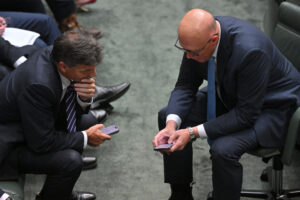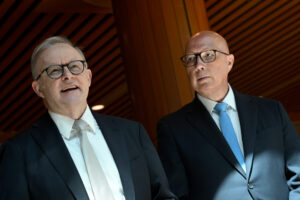The Coalition is spruiking local pork barrel projects because its poorest supporters won’t benefit from its massive tax cuts.
by Richard Denniss
[Originally published in the Australian Financial Review, 29 April 2019]
For a man with a marketing background, it’s surprising that Prime Minister Scott Morrison has ignored the credo that ”all politics is local” when selling his $300 billion income tax cuts. While he made much of the $2 million he gave to the Bronte Surf Life Saving Club during the Wentworth byelection, he is yet to mention that once fully implemented, his planned income tax cuts would deliver $210 million to the same seat each year. Talk about hiding your light under your bushel!
Of course, Morrison isn’t the only Liberal forgetting to mention that the biggest benefit on offer from the Coalition is a fist full of cash for electorates. Tony Abbott is talking up funding for public toilets when he could be talking about the $180 million per year in income tax cuts by 2024-25, that his government plans to throw to the voters of Warringah. Likewise, Treasurer Josh Frydenberg has made more of the $1.5 million he has delivered for a local pedestrian bridge than of the $150 million tax cuts will sling to his electorate.
What gives? The proposed income tax cuts are the Coalition’s centrepiece political and economic strategy, but voters aren’t being given clear information on how much money the government plans to pump into their local economies? In focusing on funding announcements for tennis courts and CCTV, Morrison seems to be running for mayor of Australia not prime minister.
Why isn’t he talking about the local economic impacts of his tax cuts? It’s simple: the marginal seats that the Coalition needs to win next month will get the least from them.
While seats like Warringah and Kooyong will see hundreds of millions of dollars per year in tax cuts flowing through their cash registers, marginal seats that sit outside of our major cities will see far less. In fact, the five electorates that cover the entire state of Tasmania will collectively receive less fiscal stimulus ($220 million) than the single electoral seat of Sydney ($260 million). No wonder they want to talk about netball.
According to the Commonwealth Department of Employment, the unemployment rate in Woollahra (NSW) is 1.7 per cent, while in Launceston (Tasmania) its 7.3 per cent, and in Bundaberg’s seat of Hinkler (Queensland) it’s at 16.6 per cent. While Scott Morrison hasn’t made clear how income tax cuts in wealthy Woollahra will “trickle down” to low-income seats, it’s clear that his government is planning a flood of money to the suburbs with the lowest unemployment rates.
Attempts to talk about the economic and social consequences of inequality in Australia are often dismissed as the politics of envy or with meaningless platitudes about “having a go and getting a go”. The reality is that using tax cuts to stimulate the economy will do nothing to create jobs in the regions that need them the most.
The contradiction between what the government says about creating jobs and what is does, is at its starkest when examining the approaches of the Coalition partners. The National Party represents many of the poorest electorates in Australia and the Nationals know their voters get almost no benefit from tax cuts for high-income earners. That’s why they insist on visibly subsidising projects like the Adani coal mine through specific buckets of cash like the Northern Australia Infrastructure Facility. They know they have to deliver something directly because tax cuts to lawyers in Brisbane will do nothing for labourers in Bundaberg.
But where Nationals prefer the trumpet, the Liberals rely on the dog whistle. If Morrison came out and told voters in blue ribbon Liberal seats that they would soon get the lions’ share of his largesse, he would never be able to win the outer suburban seats needed to form government and Nationals who support those tax cuts might lose even more votes to One Nation, Clive Palmer or the Shooters and Fishers.
So here we are, stuck in a farce with politicians suggesting that the heavily automated Adani coal mine can solve regional unemployment in Queensland and that tax cuts for people earning over $90,000 per year will help regions where almost no one earns that amount.
Unemployment is a regional problem and income tax cuts are a boon for our biggest cities. Instead of spruiking the need to have goes and get goes, the Prime Minister should simply tell us what’s the go, with where the tax cuts go?
Richard Denniss is chief economist at The Australia Institute.
Between the Lines Newsletter
The biggest stories and the best analysis from the team at the Australia Institute, delivered to your inbox every fortnight.
You might also like
10 reasons why Australia does not need company tax cuts
1/ Giving business billions of dollars in tax cuts means starving schools, hospitals and other services. Giving business billions of dollars in tax cuts means billions of dollars less for services like schools and hospitals. If Australia cut company tax from 30% to 25% this would give business about $20 billion in its first year,
The Liberal Party defies its own history on tax
For decades, the Liberal Party has prided itself on being the “party of lower taxes”.
5 ways and 63 billion reasons to improve Australia’s tax system
With a federal election just around the corner, new analysis from The Australia Institute reveals 63 billion reasons why our next Parliament should improve the nation’s tax system.


